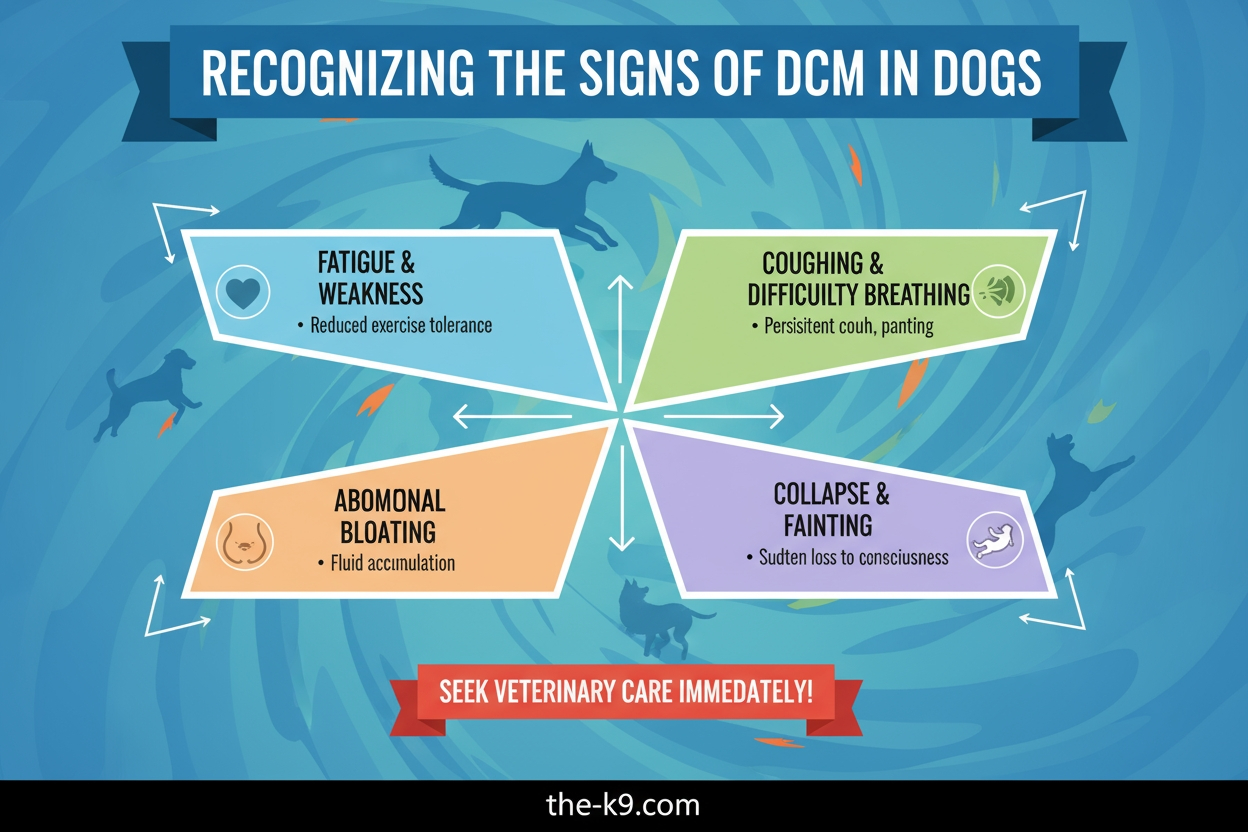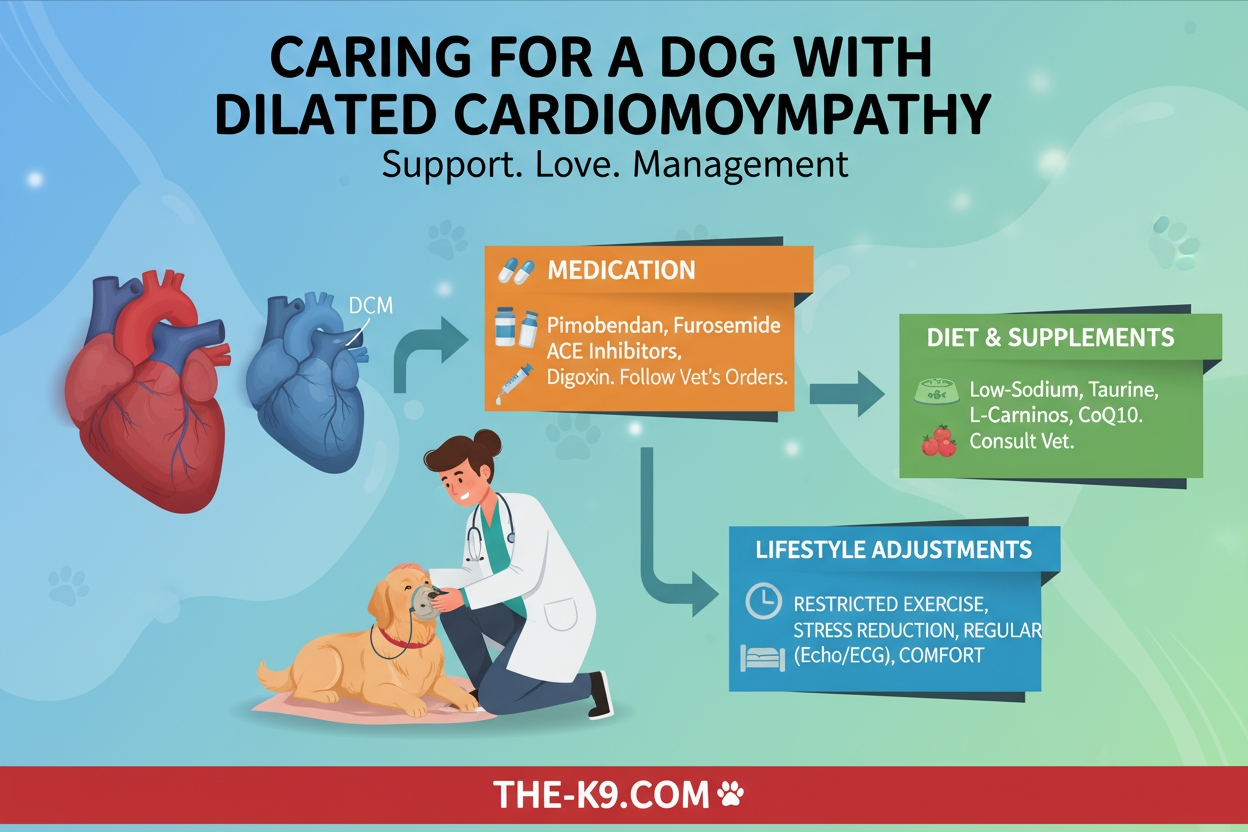
Ever think about your dog’s heart health? Dilated cardiomyopathy, or DCM, affects dogs more than you might know.
This serious issue makes the heart muscle thin and weak. The heart gets bigger and can’t pump blood well.
Since 2018, the FDA has looked into diet links to DCM. They’re focusing on grain-free diets with peas, lentils, and potatoes.
Knowing what to feed your dog is key for their heart health. Some foods might help keep their heart strong.
Looking into nutritional options like pumpkin could help your pet’s health. Let’s see how diet affects our dogs’ health.
Understanding Canine Dilated Cardiomyopathy
DCM in dogs slowly weakens the heart muscle, mainly the left ventricle. This makes the heart’s structure and function change. Veterinarians can spot these changes through proper diagnosis.
What Is DCM in Dogs?
Canine Dilated Cardiomyopathy starts with heart muscle cells breaking down. The walls of the left ventricle get thinner and weaker. This damage is visible and affects the heart’s structure.
As the muscle weakens, the heart chambers stretch too much. This makes the heart look enlarged and less effective at pumping blood.
“Cardiac health in dogs depends on maintaining strong muscular walls and proper chamber dimensions. When either component fails, the entire cardiovascular system becomes compromised.”
How DCM Affects Your Dog’s Heart Function
The weakened heart muscle struggles to pump blood well. This leads to blood backing up in the chambers, causing high pressure. The weak walls and high pressure create a cycle of further stretching and weakening.
Many dogs with advanced DCM have heart murmurs. These occur when the heart valves can’t close right, letting blood leak back. Some dogs also have abnormal heart rhythms due to the stretched muscle.
Keeping your dog healthy is key when they have heart issues. A balanced diet, including pumpkin treats for dogs, can help. For digestive problems, pumpkin for dogs diarrhea can be part of a health plan.
| Heart Characteristic | Normal Canine Heart | DCM-Affected Heart | Functional Impact |
|---|---|---|---|
| Left Ventricle Wall Thickness | Thick, muscular | Thin, weakened | Reduced pumping force |
| Chamber Size | Normal dimensions | Enlarged, dilated | Blood congestion |
| Pumping Efficiency | Strong, coordinated | Weak, inefficient | Poor circulation |
| Common Complications | None | Murmurs, arrhythmias | Additional stress on system |
The table shows how DCM changes the heart’s structure and function. Each change affects the heart’s performance, leading to DCM.
Spotting these changes early can help manage the condition better. Knowing how DCM affects the heart helps owners understand symptoms and treatments.
Recognizing the Signs of DCM

Spotting changes in your dog’s behavior and health is crucial. It’s the first step to finding heart issues like Dilated Cardiomyopathy (DCM). Symptoms often start slowly, so watching closely is important for early detection.
Early Warning Symptoms to Watch For
In the early stages, DCM signs are mild and easy to miss. If your dog breathes more than 30-35 times a minute while resting, it’s a warning sign.
They might also tire easily during walks or play. If they change positions a lot while sleeping, it could mean they’re not comfortable.
These small changes need a vet’s attention. Adding healthy foods, like learning how to feed pumpkin to dogs, can help keep them well.
Advanced Stage Clinical Signs
As DCM gets worse, symptoms get more serious. Breathing gets harder, and coughing or gagging may start.
Dogs might feel weak, collapse, or even faint. They could lose weight, eat less, and have a swollen belly from fluid.
Some dogs don’t show signs until they have a heart failure. So, keeping them healthy and well-nourished is key. Trying pumpkin dog food recipes can help keep them in good shape.
| Early Warning Signs | Advanced Clinical Signs | Important Notes |
|---|---|---|
| Increased resting breathing rate | Persistent coughing or gagging | Some dogs show no symptoms until crisis |
| Reduced exercise tolerance | Weakness or collapse | Regular vet check-ups are essential |
| Restless sleeping patterns | Weight loss and poor appetite | Nutrition plays a supportive role |
| Subtle energy level changes | Swollen abdomen | Early detection improves outcomes |
Breeds Most Affected by DCM
Any dog can get dilated cardiomyopathy, but some breeds are at higher risk. This is because of their genes. Knowing which breeds are at risk helps owners take better care and act early.
High-Risk Dog Breeds
Large and giant breeds are more likely to get DCM because of their genes. The FDA says Doberman Pinschers are at the highest risk. Great Danes and Irish Wolfhounds are also very susceptible.
Other breeds with a lot of cases include:
- Boxers
- Newfoundlands
- Portuguese Water Dogs
- Standard Schnauzers
- Golden Retrievers
Cocker Spaniels have a special case. Their DCM risk is often linked to taurine deficiency, not just genes. This shows how diet affects their genetic predispositions.
Genetic Predispositions and Inheritance Patterns
Studies by Embark Veterinary found certain genes that raise DCM risk. Doberman Pinschers have PDK4 and TTN gene variants that greatly increase their risk. These genes affect heart muscle proteins, making the heart walls weak.
These genes are inherited, so a single affected parent can pass it to their kids. This makes genetic testing very important for these breeds.
Recent FDA research found DCM in breeds not usually at risk. This suggests diet might trigger genetic risks in some dogs.
Keeping these breeds healthy is key. Using pumpkin supplements for dogs can help with digestion. These supplements also help with pumpkin for dogs constipation, which is important for dogs on heart meds that can upset their stomach.
| Breed | Risk Level | Primary Factor | Genetic Marker |
|---|---|---|---|
| Doberman Pinscher | Very High | Genetic | PDK4, TTN |
| Great Dane | High | Genetic | Not specified |
| Irish Wolfhound | High | Genetic | Not specified |
| Cocker Spaniel | Moderate-High | Taurine Deficiency | Nutrition-related |
| Boxer | Moderate | Genetic | Not specified |
Diagnosing DCM in Canines
Diagnosing DCM starts with a detailed vet check and advanced tests. Early detection is key, especially for breeds at risk. This can greatly improve treatment results.
Comprehensive Veterinary Examination
Your vet will first do a full physical check. They listen to your dog’s heart and lungs with a stethoscope. This is called auscultation and helps find any heart issues.
The vet also checks your dog’s pulse and circulation. Basic blood and urine tests check organ health. These tests help rule out other diseases that might look like DCM.
Cardiac biomarker tests give insights into heart health. Troponin I shows heart muscle damage, and ProBNP shows heart stress. High levels mean your dog needs more tests.
Advanced Diagnostic Imaging Techniques
Chest X-rays show heart problems visually. They reveal heart size and lung fluid. Vets use these images to see how severe the heart issues are.
Electrocardiograms (ECG) track the heart’s electrical activity. They find heart rhythm problems. For longer monitoring, a Holter monitor tracks heart rhythm for 24 hours.
Echocardiograms are the most accurate heart function test. This ultrasound checks heart chamber sizes and pumping ability. It’s the top choice for DCM diagnosis.
Some owners consider adding pumpkin seeds for dogs to their diet. Always talk to your vet before adding any supplements, especially with heart conditions.
| Diagnostic Test | Purpose | What It Reveals | When Typically Used |
|---|---|---|---|
| Auscultation | Listen to heart sounds | Murmurs, irregular rhythms | Initial examination |
| Chest X-rays | Visualize heart and lungs | Heart enlargement, fluid buildup | Suspected heart disease |
| ECG | Record electrical activity | Heart rhythm abnormalities | Detecting arrhythmias |
| Echocardiogram | Ultrasound imaging | Chamber size, pumping function | Confirming DCM diagnosis |
| Cardiac Biomarkers | Blood testing | Heart muscle stress or damage | Monitoring disease progression |
Regular checks for at-risk breeds can catch DCM early. Early detection leads to better treatment and management. Your vet will choose the right tests for your dog’s needs.
Current Treatment Approaches for DCM
Getting a DCM diagnosis for your dog can be scary. But, modern vet care offers many ways to manage it. These include medicines, diet changes, and lifestyle tweaks to improve your dog’s life.
Medication Management Strategies
Vets use a mix of medicines to help the heart. Pimobendan boosts heart muscle strength and lowers blood pressure. This makes the heart work better.
Diuretics like furosemide remove extra fluid from the body. This is important because heart failure can cause fluid buildup. ACE inhibitors also help by lowering blood pressure and making it easier for the heart to pump.
Anti-arrhythmic drugs are used for irregular heartbeats. Your vet will choose the right medicines for your dog based on their needs and how they react to treatment.
Dietary Considerations and Nutritional Support
Good nutrition is key in managing DCM. Some dogs might need extra nutrients, especially amino acids like taurine and carnitine. These are vital for heart health.
There’s ongoing research into how diet affects DCM. The FDA is looking into grain-free diets with peas, lentils, or potatoes.
For some dogs, changing their diet can help or even reverse DCM. Your vet can suggest the best diet or supplements for your dog based on their needs and blood tests.
Lifestyle Modifications and Exercise Guidelines
It’s important to adjust your dog’s activity level for DCM. Exercise is good, but it should be gentle and regular. Short walks are better than long, hard ones.
Reducing stress is also crucial. A calm environment and regular routines can help keep your dog’s heart healthy.
Keeping your dog at a healthy weight is also important. It helps the heart work less hard. Your vet can give you specific exercise plans for your dog’s DCM level.
Case Study: Managing DCM in a Labrador Retriever
Bailey, a Labrador Retriever with DCM, shows us how to manage this condition in unexpected breeds. His story proves that early detection and care can make a big difference.
Initial Presentation and Diagnostic Journey
Bailey’s owners noticed he was less energetic and breathed faster when resting. These signs led them to take him to the vet.
Tests like blood work, X-rays, and an ECG confirmed Bailey had dilated cardiomyopathy. This case shows that even breeds not usually at risk can get DCM.
Treatment Protocol Implementation
Bailey’s vet gave him a treatment plan. He took pimobendan, furosemide, and an ACE inhibitor. These helped his heart and managed fluids.
His diet was changed to ensure enough taurine. Exercise was also adjusted to shorter walks.
Long-term Management and Quality of Life
Regular check-ups were key to monitoring Bailey’s health. Echocardiograms and medication adjustments were part of his care. His owners kept an eye out for side effects while keeping his life quality high.
LifeLearn Animal Health says early treatment is crucial. Bailey’s early care helped him stay comfortable and active.
“Prognosis varies significantly with DCM – some dogs live 6-24 months with treatment, while certain breeds like Dobermans may survive only 3 months after diagnosis.”
| Scenario | Typical Prognosis | Key Factors |
|---|---|---|
| Early detection before heart failure | 6-24 months | Immediate treatment, regular monitoring |
| Advanced stage diagnosis | 3-6 months | Severity of symptoms, response to treatment |
| Breed-specific cases (Dobermans) | Approximately 3 months | Genetic factors, disease progression rate |
Bailey’s story shows that with the right care, even unexpected breeds can live well with heart disease. His case highlights the need for vigilance and thorough treatment.
Caring for a Dog With Dilated Cardiomyopathy

Managing DCM needs daily care and watching your dog closely. Give all medicines as your vet says, looking for side effects or behavior changes.
Check your dog’s breathing rate every day. Count breaths while they sleep. A big increase means they might need vet help fast. Also, watch for coughing, tiredness, or less activity, signs the disease could be getting worse.
Make a calm, easy place for your dog with gentle walks. Avoid hard activities. Talk to your vet or a nutritionist for the right food, especially if diet is a problem.
Go to vet visits regularly for check-ups and to adjust treatments. These visits help keep your dog’s heart disease under control and improve their life.
Report any cases of diet-related DCM to the FDA. This helps with research on this serious disease.
It’s hard to care for a dog with heart disease. Get help from vets and talk to other pet owners who understand.












